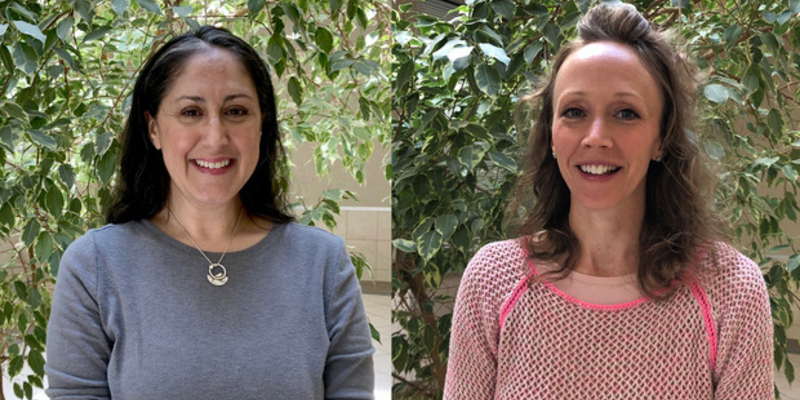Less than sixty seconds after a routine vaccination, Shayla Parker (pictured at right) felt the signs of a full-blown panic attack. It didn’t get better. In the days and months following, she was overwhelmed by brain fog, anxiety, depression, and joint pain. Heart and breathing issues followed, along with stubborn insomnia. Doctors stumbled to make a diagnosis; multiple specialists confused the situation.
The closest the doctors came to identifying what was wrong was “systemic inflammation.” But they didn’t know how to guide her to long-term recovery. Parker eventually consulted a functional practitioner who led her through a thorough examination of what was going on in her body, and how it was impacted by diet and her everyday life. Over months and years she and her family have adapted to new circumstances and made the changes that brought her symptoms under control. She’s moved away from unnecessary additives in food, cosmetics, skin lotion, laundry detergent, and just about anything else it’s possible to simplify. She will tell you it was daunting over many months, even years.
Since she was 16, Sheerine Bazargani has been prone to vertigo, ringing in her ears, and bouts of nausea. This was eventually diagnosed at Ménière’s Disease, a condition of fluid build-up around the inner ear. There is no cure; besides antihistamines and other random stabs at symptoms, the best that medical doctors have to offer is a low-salt and caffeine diet. Bazargani learned at a young age to carefully monitor what she ate. A few years back she was laid low with a resurgence of the original symptoms along along with tingling in her lips, tongue and fingers. She couldn’t face the inconvenience, uncertainty, and expense of strings of doctors’ appointments, and did her best at self-treatment. Eliminating high fructose corn syrup provided relief. Add to that gluten and any kind of sugar, and she can essentially manage symptoms. Bazargani has learned to accept and deal with chronic pain and a hypersensitivity to sensations like hot and cold. The occasional unexplained ups and downs have taught her not to take her health for granted.
 A few years back, Cynthia Voelkl was frustrated with increasing bouts of colds and flu, and didn’t get good explanations from doctors. She too tried her own elimination diet, and found that avoiding gluten in a 30-day cleanse made a significant difference. But new symptoms kept cropping up — problems with her skin, eyes, and gut, followed by dizziness, brain fog, and thinning hair. She was bounced from doctor to doctor with no relief. Ultimately, she had to leave her job and look carefully at every assumption about everyday life. For her, also, functional medicine provided invaluable insights. A biology-based systems approach, it looks for unifying factors and the root cause behind a number of different symptoms. Treatment typically starts with an array of tests to assess overall balance: blood work, allergies, and sometimes genetics. The practitioner may not offer a specific medical diagnosis, but rather an approach that strengthens the body’s ability to heal, through diet, supplements, environment, exercise, and attitude. Functional medicine may not be covered by insurance, so it’s a leap of faith to take on extra costs.
A few years back, Cynthia Voelkl was frustrated with increasing bouts of colds and flu, and didn’t get good explanations from doctors. She too tried her own elimination diet, and found that avoiding gluten in a 30-day cleanse made a significant difference. But new symptoms kept cropping up — problems with her skin, eyes, and gut, followed by dizziness, brain fog, and thinning hair. She was bounced from doctor to doctor with no relief. Ultimately, she had to leave her job and look carefully at every assumption about everyday life. For her, also, functional medicine provided invaluable insights. A biology-based systems approach, it looks for unifying factors and the root cause behind a number of different symptoms. Treatment typically starts with an array of tests to assess overall balance: blood work, allergies, and sometimes genetics. The practitioner may not offer a specific medical diagnosis, but rather an approach that strengthens the body’s ability to heal, through diet, supplements, environment, exercise, and attitude. Functional medicine may not be covered by insurance, so it’s a leap of faith to take on extra costs.
Voelkl compares dealing with a chronic illness to learning a new language — at first nothing makes sense, and only over time do you learn the vocabulary and syntax that clarify the larger context. She’s had to accept that her body is not her enemy; and to trust what it tells her. It’s a long journey to a new normal that isn’t what she ever expected.
These three have all experienced the cascade of challenges that a vague “not feeling good” can bring on. Financial stress, challenges in relationships with family, friends, coworkers. The dilemma of having an “invisible” condition that others have little sympathy for. Our medical system is not set up to deal with symptoms that can be elusive or unpredictable. A primary care physician may send you to an array of specialists for, say, unexplained eczema, migraine headaches and joint pain. They don’t talk to each other; each may come up with a separate diagnosis and treatment, none of which fixes the root cause. When those around you can’t “see” what’s wrong with you, they may doubt your word. HR departments are paid to minimize disability claims; they may go so far as to shadow your facebook page to show you’re living a “normal” life outside work.
It’s an easy time to fall prey to guilt and shame in a culture that frowns on not pulling your weight. Family and friends can weary of being your only support, when they have to unpredictably step in to cover responsibilities that you can’t fulfill. It’s important to find other non-judgmental sources of support.
Parker and Bazargani are therapists at Elliott Counseling Group. They’ve encountered an increasing number of clients and co-workers who also experience elusive symptoms that compromise their everyday lives. Anxiety and depression may bring people to counseling, but the underlying causes can be physical. The list of chronic conditions is vast: allergies, asthma, diabetes, fibromyalgia, chronic fatigue syndrome, celiac sensitivity, endometriosis, PMS, lupus, autoimmune disorders, ongoing dental problems, ADHD, and even aging. As many as 133 million Americans, 45% of the population, deal with at least one such compromising condition.
Parker, Bazargani, and Voelkl, with the support of Sandra Ahten, ECG’s CEO, have developed a program called Thriving with Chronic Illness. They’re offering two 12-session support groups, beginning in September, to provide a place to process the significant challenges of compromised health. Introductory sessions on August 19th and 20th are a way to sample the groups’ format and content. Essential issues on the table are how to be supported in your community, how to ask for flexibility from family, friends, and co-workers; getting the most from professional support, and exploring complementary and integrative medicine.
A support group can offer a safe place that validates what you’re experiencing. Sharing different perspectives opens a wide array of experiences and information on alternative treatments, tips on how to deal with energy levels, dietary changes, and more. How to compile a log of symptoms so a doctor gets the best sense of what’s going on. Better yet, laugh together over the dread when, yet again, you have to grill a waiter about the specific ingredients of multiple dishes, and even then may end up ill. A person going through a health crisis will need to learn to forgive themselves, over and over, for the moments when they need to cancel a commitment or ask for help. It may require re-evaluating every aspect of life, and then establishing and accepting a new normal. Learning that your body is not the enemy — it can be smarter than your mind about what it needs.
Insurance may cover the support groups; the diagnosis of “adjustment disorder” from a doctor will qualify. If not, there’s a modest co-pay.
Good health is invisible and unquestioned. When health falters it can often be invisible as well, and not recognized by those around you as a long-term, life-changing circumstance. There is wisdom to be gained from sharing experiences and insights.
For more information about Thriving with Chronic Illness, call 217-398-9066 and ask for Thrive Group Client Care Specialist, Melanie, or email [email protected]. Introductory sessions are scheduled for Monday, August 19th, 5:30-7 p.m., and Tuesday August 20th, 10- 11:30 am at 201 Lincoln Square, #154A, Urbana.








